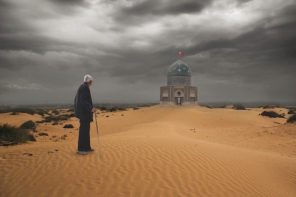Friends, critics, and loved ones alike have asked, “What? What are you going to Iran for?” The conversations take a more inquisitive turn when I note that I am leading a civil diplomacy mission to Iran on the behalf of the Fellowship of Reconciliation, the 93-year-old interfaith and international movement to promote peace and nonviolence.
“What do you hope to accomplish?” they ask.
Then the concerns of friends, critics, and loved ones diverge in intent. Critics, if they don’t immediately call me unpatriotic, point out my naiveté. Decrying any meeting with “those people” as futile, they insist that the Iranian government is oppressive, possesses nuclear weapons, and needs to be toppled. (According to the US's own NIE Iran does not have nuclear weapons though it does have the right under the Nuclear Non-Proliferation Treaty to enrich uranium for ”peaceful” purposes.)
Friends share this concern for my naiveté, though not about Iran as about my own government’s foreign policy. “Look at Iraq,” they sternly warn me. “What makes you think you can stop a war with Iran?” they ask with furrowed brow. There is so much work that needs to be done in the US for peace, justice, and reconciliation, they note. “What if you are kidnapped or killed? What about your kids?!”
To of these “Whats?” I offer the following:
While I have spent the majority of my adult life as an organizer and activist, I am first and foremost a minister of the gospel of Jesus Christ. I stand in the tradition of my grandfather, the late Elder James Thomas, who believed Jesus to be the “Prince of Peace,” and that the task of the preacher is to preach peace. With less than a third grade education in the fields of Zent, Arkansas, granddaddy poured into me the hope of his slave grandparents. “Boy”—his term of endearment—“You must take your schooling and use it to make people free.” When I was ordained in the tradition of my grandfather, The Church of God in Christ, the Bishop and elders laid hands on me with these words: “Follow peace with all men, and holiness, without which no man shall see the Lord” (Hebrews 12:14 KJV).
Moreover, the third sentence of the Church of God in Christ's constitution is a conscientious objection statement against war. I am bound by the tradition of my grandfather to be a voice crying out in the wilderness, “peace!”
Throughout the course of my imperfect ministry, I have attempt to honor the hands that ordained me. Equally, I believe that to be Christian, of any kind, who honors the life and legacy of Jesus of Nazareth, one is called to stand in opposition to powers and principalities that seek to curb the life chances of humanity. With the warmongers rattling sabers against the people of Iran, I believe that I am called by God as a Christian to go to Iran; it is my witness as a Christian at this moment in time.
Central to the mission and ministry of Middle Collegiate Church, where I am now an Associate Minister for Social Justice, Missions, and Community Action, is a belief in the universal love of God and hope of peace. With the blessing of my pastor Rev. Jacqueline Lewis, I go.
I am honored to have been asked by the Fellowship of Reconciliation to lead this delegation. For nearly a century this organization has stood, often alone, as a voice for peace. As a Freeman Fellow I have bathed in the organization’s archives and been baptized in its historical waters of pacifism, nonviolence, and civil disobedience. With civil diplomacy delegations dating back to the Cold War, FOR has had the courage to extend the hand of peace and reconciliation while our government issued threats of war and retaliation to Russia and China, currently partnering with peace communities in Colombia.
This, the eighth FOR delegation to Iran, includes a wide range of individuals committed to peace and justice in the region. I shall accompany noted Bush Administration critic and former UN weapons inspector, Scott Ritter, and a twenty-something, half-Jewish/half-Iranian woman who has never been to Iran. Our aim is simple: to prevent another war in the region. For two weeks in August we will meet with religious leaders, government officials, and ordinary Iranians to say: war is not the answer.
During our time across the Atlantic, I will be meeting with leadership of the World Council of Churches in Geneva, Mouvement International de la Réconciliation (MIR), the French affiliate of the Fellowship of Reconciliation, and members of the French Parliament in Paris in an effort to build an international, interfaith coalition to prevent a war against the precious people of Iran.
The hope for peace and the freedom yearned for by my great-great parents, I carry with me to Tehran. Ultimately, this delegation is not for the government of Iran but for our own government. We are attempting to model what it means to talk directly with the people with whom there is perceived conflict. To seek peace with all humans is the holiest of acts. If, God forbid, the US becomes involved in a war on Iran, we will not have failed. If we do not go, therein lies the failure—a failure of nerve and a failure of faith.
This is why I'm going to Iran.



